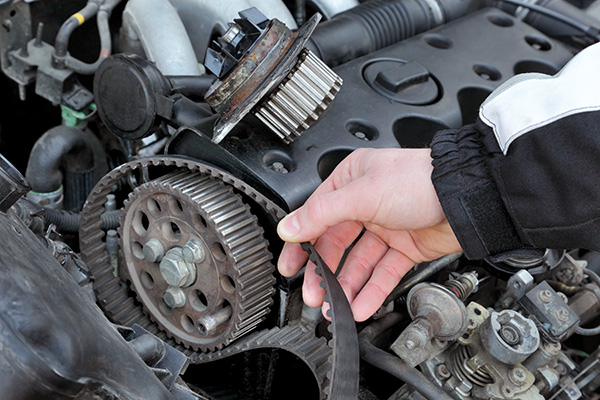
Did your engine suddenly stop dead? There was no warning, no strange noises—just silence. If this happens, there's a good chance your timing belt has snapped, and the consequences for your engine could be severe. But what exactly does a broken timing belt mean for your engine? Can it really cause irreparable damage? Let's look into the timing belts to understand their importance and what happens when they fail.
The Role of the Timing Belt in Your Engine
To explain the potential damage a broken timing belt can cause, it's essential first to understand what a timing belt does. The timing belt is a crucial component in your engine, responsible for synchronizing the movement of the camshaft and crankshaft. This synchronization ensures that the engine's valves open and close at the right time in coordination with the movement of the pistons. Essentially, the timing belt keeps your engine's components in perfect harmony, allowing it to run smoothly and efficiently.
Without a functioning timing belt, the camshaft and crankshaft fall out of sync, leading to a variety of engine problems. In some cases, the engine may stop running altogether, while in others, severe internal damage may occur—damage that could lead to costly repairs or even the need for a new engine.
What Happens When a Timing Belt Breaks?
So, what exactly happens when a timing belt snaps? The outcome largely depends on the type of engine your vehicle has—specifically, whether it's an interference or non-interference engine.
Interference Engines
In an interference engine, the valves and pistons share the same space within the engine cylinder but at different times. When the timing belt breaks in an interference engine, the camshaft stops moving, which means the valves stop moving as well. However, the crankshaft can continue to rotate due to momentum, causing the pistons to move up and down. This can lead to a catastrophic scenario where the pistons collide with the stationary valves, bending them or even breaking them off. This kind of damage is severe and often requires a complete engine rebuild or replacement.
Non-Interference Engines
If your vehicle has a non-interference engine, the scenario is less dramatic. In these engines, there's enough clearance between the valves and pistons that even if the timing belt breaks, they won't collide. While the engine will still stop running, the internal components are less likely to be damaged. The worst-case scenario is that you'll need to replace the timing belt and perhaps a few other components, but your engine itself should be spared from major harm.
Signs Your Timing Belt Might Be Failing
Given the critical role the timing belt plays, it's important to know the warning signs that might indicate it's time for a replacement. Unfortunately, timing belts don't always give clear signals before they fail, but there are some symptoms you can watch out for:
1. Ticking Noise from the Engine
A ticking noise from the engine could be a sign that your timing belt is beginning to wear out. This sound is caused by the belt's teeth becoming misaligned or worn down, causing it to slip.
2. Engine Misfires
If the timing belt is slipping, it can cause the engine's cylinders to open and close at the wrong time, leading to misfires. If you notice your engine misfiring, it's a good idea to have your timing belt checked as soon as possible.
3. Oil Leaks from the Front of the Engine
A worn-out timing belt can cause the engine to leak oil. If you notice oil leaking from the front of the engine, it could be a sign that the timing belt cover is loose or damaged.
4. The Engine Won't Start
If your timing belt has already broken, the engine will not start. You may hear the starter motor engaging, but without the timing belt to keep the engine's components in sync, it won't fire up.
The Importance of Regular Timing Belt Maintenance
To avoid the potentially disastrous effects of a broken timing belt, regular maintenance is crucial. Most vehicle manufacturers recommend replacing the timing belt every 60,000 to 100,000 miles, depending on the make and model of your vehicle. However, it's always best to consult your owner's manual for the specific interval for your car.
Replacing a timing belt isn't a minor job—it requires skill and precision and often involves removing several other components to access the belt. While it might be tempting to delay this service due to the cost, doing so could lead to much more expensive repairs down the road. In fact, in the case of interference engines, replacing the timing belt on time can mean the difference between a simple service visit and a complete engine overhaul.
Is your vehicle due for a timing belt inspection? Don't wait for a breakdown—visit NOLA Automotive Repairs today! Our expert technicians will ensure your timing belt is in top shape, giving you peace of mind on the road.